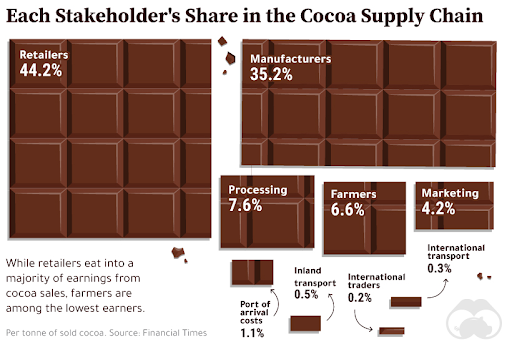
Morning all. After a few days of rampant sales and consumption, today is #GivingTuesday a day for charitable deeds and ‘getting better at doing good’.
In today’s edition:
🍺 Carlsberg make clean water from thin air
🍫 Ben & Jerry’s paying Cocoa farmers a living wage
🌬️ UK finance world’s biggest offshore wind farm to power 4.5 million homes

Sharing out the (cookie) ‘dough’
Ben & Jerry’s has committed to paying cocoa farmers in Côte d’Ivoire a living wage. The $130B chocolate industry relies on cocoa farming to supply chocolate’s key ingredient. Yet, cocoa farmers make less than $1/day, as their income is determined by the global commodity market. In partnership with Fairtrade America, Ben & Jerry’s are ensuring 5,000 cocoa farmers in Côte d’Ivoire (which produce 70% of global cocoa) will receive an additional $120 per farmer, per year. Promoting financial welfare will also improve stability in Ben & Jerry’s supply-chain, with farmers in a more secure position to feed themselves, their families, and Ben & Jerry’s customers.
The challenge: Cocoa beans and money exchange hands over a dozen times before reaching farmers, so ensuring they receive a fair share of earnings is easier said than done. Blockchain technology could be the solution – with trials aiming to enhance transparency across Cocoa supply chains.

Walmart buys food delivery app with a twist Joyrun
Joyrun offers a unique twist on your standard ‘on-demand’ food delivery app: peer-to-peer delivery. The company’s app lets you find people, nearby, who are already heading out to a restaurant that you like, and lets you join in on their order. The ‘runner’ can choose to request a delivery fee, or pick up everyone else’s orders out of the goodness of their hearts. Walmart has purchased the company in a bid to incorporate its peer-to-peer delivery into its own last-mile logistics.
Our take: Online shopping for groceries is emission heavy. Joyrun offers another novel method for Walmart to shrink the carbon emissions of its last mile deliveries by capitalising on their in-store customers (Adding to their delivery drone and autonomous electric vehicles fleet)
🤖 Future of Tech (1-minute read)
Plastic-free textile innovation gathers momentum
60% of all textiles used in apparel are derived from plastic, equivalent to 3 trillion plastic bottles every year. A high-fashion dress concept, created by a graduate from Central Saint Martins, is made from silk cocoon protein and algae extract – forming a textile which is completely biodegradable. The textile is created by pouring a liquid mixture onto a 3D mold, which can dissolve at different rates depending on the temperature and pH of the water it is placed in. Whilst just a concept, it points to a future fashion lifecycle where garments are intentionally designed to be sustainable.
Is algae the answer? Algenesis recently created a flip-flop made of biodegradable plastic. While designer Charlotte McCurdy launched a raincoat made from plastic-mimicking algae. Ultimately, these projects demonstrate that emerging designers recognise the industry’s need for change.

Carlsberg make clean water out of thin air
We love a story that makes us feel a little better about having a beer. Carlsberg Group has announced their partnership with Netherlands-based desalination company, Desolenator, to create the world’s first “solar thermal water purification” facility. In plain english – the plant will use solar energy to convert saline water into clean drinking water for a town of 4,000 in West Bengal, near one of Carlsberg’s breweries. The factory will also upskill local female entrepreneurs to staff the facility and undertake further R&D.
The big picture: Less than 1% of international climate funding was allocated to water access in 2018, despite two billion people globally lacking access to clean water. Water stewardship by big business is key to bridging the gap in investment from governments. With water being one of the four main ingredients in beer, stewardship has the added benefit of securing Carlsberg’s supply chains in high water stress, low income regions.
💡Start-up Spotlight (1-minute read)
Funding for micro-mobility integration
E-Scooter start-up, Spin, has launched the UK’s first micro-mobility fund to advance micro-mobility (lightweight devices operation at speeds under 15 mph) policy and roadway safety. The fund will support universities exploring the challenges and opportunities of integrating micromobility into existing transport networks. Data will be collected using on-street artificial intelligence (AI) and Internet of Things (IoT) sensors in city’s where E-Scooters are used (such as Milton Keynes). Possible outcomes include mapping “safe routes” based on riding patterns, and recommendations for authorities to encourage safe E-Scooter use – providing communities with sustainable, fun and socially-distanced ways to travel.

Little Bytes
Quote:“In the education sector the biggest challenge is the ‘digital divide’. Now that remote working and learning has become entrenched, I think there is a gap between people who have access to technology and those that don’t. Narrowing this gap will determine how we succeed as a society.” Ryan Graham, CTO, Texthelp
Stat: Half of the world’s biggest industrial, energy, FMCG, retail and manufacturing companies are using artificial intelligence (AI) to reduce their emissions’ Capgemini Research Institute
Watch: We could be flying in zero-emission aeroplanes by 2035
🗞 In other news…
KFC deploys autonomous 5G food trucks in China
UK public pension funds suffer £2bn hit to oil investments
Phood Helping kitchens monitor food waste
Goldman Sachs back organic tube-feeding formulas
- UK finance world’s biggest offshore wind farm to power 4.5 million homes




